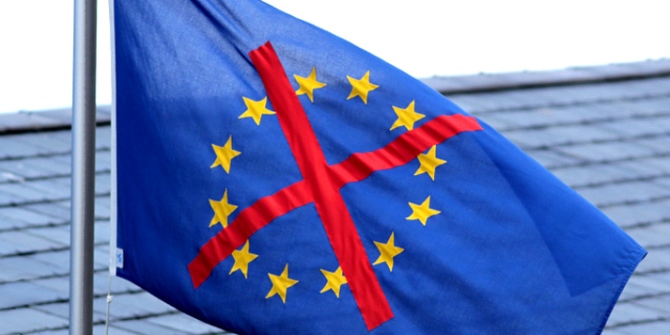 An article in the German news magazine Der Spiegel generated headlines in the UK press over the weekend when it appeared to suggest Germany would rather let Britain leave the EU than accept changes to EU free movement rules. Imke Henkel writes that while the reaction in the UK to the comments has been somewhat overblown, there is nevertheless growing German frustration at David Cameron’s approach to the EU.
An article in the German news magazine Der Spiegel generated headlines in the UK press over the weekend when it appeared to suggest Germany would rather let Britain leave the EU than accept changes to EU free movement rules. Imke Henkel writes that while the reaction in the UK to the comments has been somewhat overblown, there is nevertheless growing German frustration at David Cameron’s approach to the EU.
Is this the end of the affair? If so it would be a tragic one, because both sides still love each other. Misunderstandings and rash words are to blame for the looming split, it seems. Britain and Germany share many common interests in Europe. Therefore the German Chancellor as well as various German politicians have made it clear in the past that they would be very sorry to see Britain leave the European Union. In return, the British Government, especially the governing Tory party, seemed intensely relaxed in their belief that German backing would guarantee a successful result in future negotiations over EU reforms and more specifically in granting Britain her wishes regarding special rights within the EU.

“Berlin will do anything to keep us in the Union”, was a sentence Tory parliamentarians would repeat whenever Britain’s position in the EU was discussed. MPs belonging to their German sister party, Angela Merkel’s CDU, seemed less sure. Their view sounded rather more nuanced: “Britain is an important ally within the EU, it would be bad for Europe if Britain left, but it is not true that no price would be too high to keep her in.”
Now it has all blown up. Or at least it came very close to a blow-up. German government officials have made it known to the news magazine Der Spiegel that Berlin is fed up with a British Prime Minister who, in his fear of UKIP and his own Eurosceptic backbenchers, further and further retreats from negotiable positions into a territory where EU treaties would be violated. For the CDU, discussing the curbing of benefits for EU migrants is all very well, as the abuse of the free movement of workers is not intended by any European treaty and should be dealt with in a reasonable way. Besides, as Merkel’s spokesperson Steffen Seibert clarified again on Monday: “The fight against the possible abuse of free movement is of legitimate interest for us in Germany as well.”
But curbing the free movement of labour itself? This would put into question one of the four fundamental economic freedoms of the EU: goods, services, capital and indeed labour (the British government, incidentally, does not seem to have any trouble with the other three). These freedoms go back to the 1950s, the founding treaties of Paris and Rome, a good 15 years before Britain even joined. It should not come as a surprise that the German Chancellor would see the treaties of Paris and Rome as non-negotiable.
In Britain, Merkel’s positioning via a news magazine was seen as harsh. David Davis, once a candidate for the leadership of the Conservative Party against David Cameron, and now a backbench MP, spoke of “bloodcurdling comments”. Instead I would argue the Spiegel leaks rather betray a frustration with a British government that continues to fall back on the steadfast belief in German help like a wayward child relies on their mother’s never-ending love. In this context, the German officials’ indiscretions to the Spiegel were no more than a rise of voice by the German Government.
Cameron has misread Merkel before: most notoriously in December 2011 when the British Prime Minister visited the German Chancellor in Berlin only days before an EU summit which was to vote on the fiscal compact. Cameron came away from his conversation with Merkel believing that he had won her support for his wish list of special guarantees regarding British interests. German officials on the other hand were adamant that no such guarantees had been given.
When the EU Council convened on the night of 9 December Cameron tried to play on Merkel’s support and failed. Britain was the only EU country to vote against the fiscal compact and was left isolated. Ever since there has been speculation over how it was possible that the two leaders met and so completely misunderstood each other. Other misreadings followed. Most recently the Prime Minister was so certain that he could rely on Merkel in his opposition to Jean-Claude Juncker as a suitable candidate for the next EU Commission President that he completely overlooked her own difficulties at home, which, it should be added, she didn’t handle too skilfully herself.
Fundamental differences in the UK-German relationship
The present altercation reveals two essential differences between the British and the German governments. The first concerns the management of the government and the governing party itself. Merkel is in her third term as German Chancellor. She has a firm grip on her party and, for that matter, on her changing coalition partners. Cameron to the contrary has allowed himself to be pushed and pushed again first by the Eurosceptic wing of his party and now by the UKIP.
Cameron’s tone on Europe has changed significantly since January 2013 when he gave his Bloomberg speech. Then the Prime Minister argued for the merits of the European project and stressed the necessity of reform. Many in Germany agreed with him. Since then, Cameron’s Eurosceptic backbenchers have rebelled again, UKIP have won the elections to the European parliament in Britain and won their first parliamentary seat thanks to a defected Tory MP. The prospects for the coming general election are dire. Cameron has therefore made EU immigration one of his main topics, stressing that in contrast to the Union between Scotland and England, being part of the EU was not a matter of the heart for him.
German politicians look on with worry. Comments from Jens Spahn, member of the German Bundestag and one of the rising stars within the CDU, have been typical of the bewildered mood: “We certainly are very much interested in Great Britain staying in the EU, because the country is an important partner in regard to the single market, free trade or realising subsidiarity. But curbing the free movement of labour violates the principles of the European idea, that is not on. I fear that Cameron started a race with UKIP which he cannot win. People will vote for the original. And he makes things very difficult for all European friends of Great Britain.”
Recently members of the Committee of Foreign Affairs of the German Bundestag visited London to meet their British counterparts. The German politicians were delighted by the pleasant, calm and reasonable conversations. However, they also showed themselves to be shocked by how much UKIP has come to dominate the debate within recent months. Norbert Röttgen, Chair of the Committee on Foreign Affairs, noted that “at the beginning of the year we got the message that the UK economy was doing fine, everything was on the up. Now it was immigration, immigration, immigration”.
The other essential difference between the German and the British governments is a fundamentally different approach to the management of EU politics. The British visceral belief in bilateral relations led Cameron to court Merkel as the one European ally who will deliver the rest. In February, he invited the German Chancellor to speak before both houses of parliament and made sure she felt treated in the most favourable way. During this visit, however, Merkel hinted that the Prime Minister was missing a point. When asked by a British journalist about her relationship to Cameron she replied, slightly patronising in her best Mutti-voice: “Let me explain: Europe consists of 28 member states”.
Put simply, for Merkel politics in Europe develops out of an immensely complex agreement between 28 partners. Britain, as important as it may be, is one among the rest. Or, as the former Berlin correspondent for the “Financial Times”, Quentin Peel, recently put it: “The priorities for Germany are: One, stabilise the euro. Two, stabilise the euro. Three, stabilise the euro. Four, probably energy security. Five, keeping Britain in the EU.”
Yes, Britain is an important partner for Germany in Europe. But given the challenges Europe faces in dealing with ISIS, Putin, climate change, and economic stagnation, it’s not the first place to look. A British Government that allows itself to be chased by a small populist party ceases to be an important ally. Or, as Thomas Jarzombek, another German parliamentarian and member of the CDU, warns: “If you climb a tree stop in time before you can’t climb down again.”
Note: This article was originally published on our sister site, the LSE’s EUROPP blog, and gives the views of the author, and not the position of EUROPP – European Politics and Policy, nor of the London School of Economics. Please read our comments policy before commenting. Featured image credit: Number 10, Crown Copyright (CC-BY-SA-3.0)
 Imke Henkel was the UK correspondent for the German news magazine “Focus” for 10 years. Before this she wrote for “Sueddeutsche Zeitung” from London. Recently she published the essay “The Perils of Ignoring the Odd One Out: What Europe (and Germany) Can Learn from Britain” in I. Finkel, J. Jungclaussen, P. Littger, C. Ryland (eds), “Common Destiny vs. Marriage of Convenience. What do Britains and Germans Want from Europe?” (Hamburg, London 2014). She now writes for ZEIT ONLINE among others.
Imke Henkel was the UK correspondent for the German news magazine “Focus” for 10 years. Before this she wrote for “Sueddeutsche Zeitung” from London. Recently she published the essay “The Perils of Ignoring the Odd One Out: What Europe (and Germany) Can Learn from Britain” in I. Finkel, J. Jungclaussen, P. Littger, C. Ryland (eds), “Common Destiny vs. Marriage of Convenience. What do Britains and Germans Want from Europe?” (Hamburg, London 2014). She now writes for ZEIT ONLINE among others.







